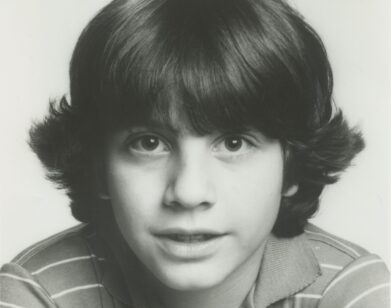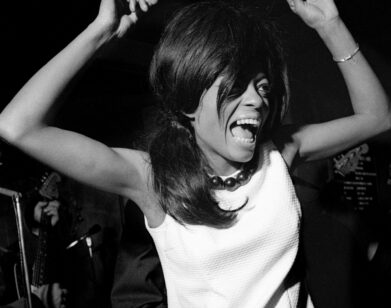LIT
Ben Fama on Paranoia, Puffy Pouts, and the Perversities of the Internet
It’s common to question reality in a world consumed by images, one where our sense of self is no longer fixed. Reality is an impossible chimera. Who knows when this feeling originated, but I’d assume long before Baudrillard’s notion of hyperreality. Maybe Plato had similar thoughts in Ancient Greece. I imagine he’d absorb reality television and A.I. into his world view and return with an even more salient theory. It’s no mystery this feeling of deluded narrative and modern, never-ending anxieties will escalate. It’s easy to blame social media, TV, or even the larger entities controlling both. And while it’s impossible to predict the future, Ben Fama uses these contemporary signposts—celebrity culture, Instagram voyeurism, drug-induced comas—to expose the deceptively glamorous exterior of this American life and ironically showcase the absurdity of chasing another sticky Hollywood dream.
In his debut novel, If I Close My Eyes, two characters meet after surviving a mass shooting at a Kim Kardashian book signing on Fifth Avenue. As a result, Jesse Shore, a 19-year-old aspiring screenwriter, and Marsy-Rose Arenas, a 30-year-old struggling actress, are pulled into momentary fame. Jesse loses his sobriety, and Marsy-Rose (Mars, for short) tries her best to capitalize on this sudden publicity and recover from a disastrous relationship with a semi-famous narcissist. There are numerous, real-life cameos: Marilyn Manson, Megan Fox, and Judd Apatow all make appearances, adding to the novel’s absurd, self-referential portrait of a world overloaded with information, obsessed with the glitter of stardom.
An extension of Fama’s poetry and even his publication, Wonder Press, the novel digs beneath the supposedly cursory world of contemporary culture to explore the desperation, humor, and perversity of living today. Before its publication, Fama got on the phone with me from his apartment in Ridgewood to discuss TikTok reality, romanticizing bad boys, and Simone Weil’s legacy.
———
TAYLOR LEWANDOWSKI: How’s it going?
BEN FAMA: Pretty good, pretty good.
LEWANDOWSKI: I saw you posted a Jimmy Buffet song earlier. We’re talking on the day Jimmy Buffet passed away. It’s sort of a surreal and sad day.
FAMA: It’s an opportunity to honor him. I’m not the biggest Parrothead in the world. I’m amused by the culture he created. I think he’s become a billionaire with his hotel chain. When I talk to musicians, they always tell me that.
LEWANDOWSKI: I remember walking into Margaritaville in Las Vegas. Everything is a replica of reality. The carpet looks like sand. The bartender is wearing a Hawaiian shirt. Jimmy Buffet’s music looped on the stereo. It feels real, but it’s not real, which reminds me of what you’re exploring in If I Close My Eyes. From the beginning, there’s a lot of reality TV and online voyeurism.
FAMA: In the novel, Jesse finds himself caught up in reality TV, but isn’t really interested in reality TV, so there’s an ironic slant from the beginning. Like Mars, she’s interested in using the culture industry as far as it can help her own acting career. She’s older and more savvy. She’s trying to control the media, use this minor interest, and snowball the online voyeurism. She’s really online. He’s not at all. He schedules time to post, but you can tell his heart isn’t in it. We’re in a world right now where engaging with people’s content can turn their life into a full-time career. Mars’ goal is to become popular enough online that someone will cast her. I guess the flipside of paranoia is gaining from that system.
LEWANDOWSKI: Gaining from that system?
FAMA: Yeah, gaining from people you cannot see who are watching you as an audience. A way of controlling paranoia. The whole world is a stage for TikTok. They encounter a lot of people who are just online, constantly taking selfies. There’s a part when he’s unwittingly in a reality TV show. There’s a girl he thinks needs to be rescued. It’s just a candid camera operation.
LEWANDOWSKI: I liked that, because as a reader you think it’s real until it’s obviously not.
FAMA: It’s a moment in the book, but the fact you can go to the grocery store and end up on a viral meme—I don’t know what kind of world we live in.
LEWANDOWSKI: How did you arrive at this concept of a mass shooting at a Kim Kardashian book signing?
FAMA: I definitely wanted to show the stakes of how I see the zeitgeist right now. We’re in a gun-crazed situation. It’s almost rote now to learn about another public shooting. I was a student at Virginia Tech when that shooting happened. It changed the way I saw the world.
LEWANDOWSKI: You were on campus when it happened?
FAMA: Yeah. I wasn’t in any of the buildings he was in, but I was at home near the campus. It was really scary. It’s in a sleepy town so it was a sharp contrast from the general vibe of this Appalachian college. Beyond that, the shooter, who was very savvy, created media and mailed it to CBS. It was overwhelming. I wanted to exorcize this from my system. I didn’t want to spend too much time in the head of the character who would commit a school shooting, so I did just enough—a little bit of research—to move the plot.
LEWANDOWSKI: Do you feel like you have exorcised it?
FAMA: Honestly, the book is such a fabrication. It’s so fictionalized, so not really. I mean something similar did happen to Christina Grimmie, who was on “The Voice.” She was shot point blank. Very bleak.
LEWANDOWSKI: I’m sure it will stick with you.
FAMA: Oh, that was almost twenty years ago. It’s peanuts compared to what’s happening now. Like at Mandalay Bay in Las Vegas.
LEWANDOWSKI: I remember visiting Las Vegas shortly after. I passed the scene in a taxi. The whole area was fenced off with yellow caution tape. You couldn’t see anything, but you knew what had happened.
FAMA: That’s really fascinating, because I’m interested in environments like that. It’s undefinably real. You can go up and touch that tape. There were people who died there. You can’t get away from this. That’s why I wanted to write the haunted house scenes, because it’s another physical space you can be in your body and perceive threat, but it’s not a threat. There’s a control element. You submit to not being in control and you come out of it more comfortable with the uncertainty.
LEWANDOWSKI: I wonder if we’ll see that more often. These perversities born out of living in the modern world and coping by staging or representing them in art. Like Mars using the paranoia of social media as a tool for her own success. You’re turning these harmful mechanisms into something useful.
FAMA: Yeah. I think there are useful social media functions. Perverse is such a good word. There’s no neutral reality anymore. The caution tape has been put up. No turning back. The nature of our experience is predetermined and reported online immediately.
LEWANDOWSKI: There’s this specific moment in the novel, where Jesse relapses and the next day he’s talking to his successful TV writer dad. He’s romanticizing these actors like River Phoenix and Robert Downey, Jr., as if it’s a justification for his hangover. Also, Mars is trying to adhere to the image of a successful actress, highly adaptable, narrowly defined. This idea also haunts the novel. How are these celebrity images used to expand or collapse our identity?
FAMA: Jesse latches onto this bad boy persona, even though he really isn’t one. It’s a delusional optimism. He’s at a rock bottom at that point. He’s had this whole meltdown. The whole fascination with celebrities hitting their bottoms as clickbait is interesting, because it’s very gendered. Jesse could do that, like Robert Downey, Jr. as a comeback to have this amazing career. I’m not sure Mars could do that. Celebrities are already the dogs of our culture. There’s a special viciousness to pictures of Britney Spears, Lindsay Lohan, et cetera. As far as narrowly defined, no one really knows the truth of Mars. She doesn’t have much money, not much success, barely any credits. She hides her age, because age is like death as an actress, if you haven’t made it. She’s doing everything she can. She has a very tight grip on her image.
LEWANDOWSKI: She has a tight grip of her image, but they’re reflections of what she thinks is successful, or how others perceive successful, right?
FAMA: Yeah. You’re always photo-ready. Everyone is a celebrity. It’s very Warhol, except it’s people liking your post.
LEWANDOWSKI: It’s interesting, the hunger for the image, or the creation of the image.
FAMA: It’s tricky. We’re so far into the image culture. That flat affect with the puffy pout posted online. People throw their hearts and notifications on it. It’s the texture of the 21st century. Similarly, the pool as site of contemplation and reflection—the rippling surface mirrors how other images or surfaces interact. Early on, Jesse meets Mars because he believes they have this connection. He’s probably seen millions of images of hot girls online, but she’s the only one that reached below this surface. He goes straight into fantasy.
LEWANDOWSKI: I thought about this idea reading the book: yearning for immortality while also hoping to eradicate any kind of feeling. What do you think about this?
FAMA: Well, I think yearning for immortality is a fear of death. You’re trying to outrun time. And beyond the whole existential dread, the worry that life doesn’t have any meaning. All this suffering is for what? Just worried about time passing or getting uglier and thinking about what’s appealing or what’s relevant. Or, believing you’ve wasted your life or didn’t achieve your goals. Or not being loved. A lot of the substance abuse covers up those feelings. But, are you really ever going to get those things? What if it’s just not possible? I think that’s what sends Jesse into oblivion and Mars, too. Her clock is ticking a little more loudly. Jesse hasn’t really thought about it. She’s really holding out on a miracle. Youth culture is the industry. As long as people are worried about how they look like, there will always be images put before us relentlessly. That fear is created. Wrinkles aren’t good or bad, but they’re bad if we have youth as an ideal.
LEWANDOWSKI: How is the creation of Wonder Press a continuation of your work as an artist? I found the old Wonder manifesto on Tumblr. It has this adversarial tone, an insistence on being something other than mainstream and the MFA content farm.
FAMA: An old editor created that. That was a really long time ago. I have no idea what that says, to be honest with you. One of the fun things of social media is daring someone to take you seriously. That’s a spirit I still embody, either in poetry or fiction. Daring you to read it only one way. My poetry, my novel, and Wonder to some degree have this play on the superficial.
LEWANDOWSKI: What do you mean?
FAMA: Early friends who read my book said that the inclusion of Kim Kardashian was a huge blemish on it. I was annoyed, because you’re falling for the wrong things here. That’s in the book because that’s in the world. I’m writing the world I live in. That’s not what the book is about. If you can’t get past that, you’re not going to resonate with it. I’m okay with that. You fell for it. You fell for the myth. I always liked things that seem superficial but are actually complicated.
LEWANDOWSKI: I saw you’re starting a class on Simone Weil’s Gravity and Grace. How is she important to you?
FAMA: I read her book and it blew my mind. She is so dedicated to the truth. It’s so hardcore. It’s really powerful to me. Her god is not a present, interventionist god. Bad things happen in the world because people to do them. Or, it’s nature. People shoot each other because they’re jealous or feel like they have no efficacy. There’s redemption in suffering. There’s a sad, hard acceptance of the world as the world is and I relate to that.
LEWANDOWSKI: It’s interesting to juxtapose her thought and your work. Do you think literature has the possibility to alleviate this mounting, digital age alienation?
FAMA: I think to be individual can change things. You’re not going to change the whole world with a book. Things are so specific. If I sit down and read for an hour, I feel like I’ve had a brain massage. It’s incredible. The book is a convenient form for people and it’s never going to go away.







